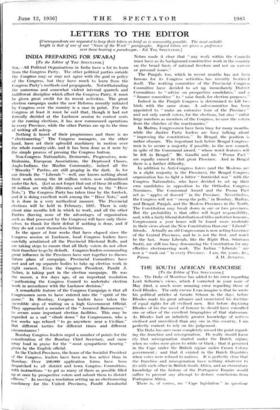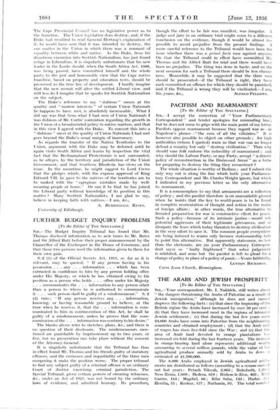THE SOUTH AFRICAN FRANCHISE .
[To the Editor of THE SPECTATOR.]
S►a,--The Duke of Montrose has added to his error regarding Lord Selborne's views, which I corrected in your issue of May 22nd, a much more amazing error regarding those of Cecil Rhodes. The only excuse I can imagine is that he wrote his political articles at Groote Schnur in the days before Rhodes made his great advance and enunciated his doctrine of equal rights for all civilised men. But before deriving Rhodes of his due meed of honour he should have consulted one or other of the excellent biographies of that statesman. As Rhodes had an infinitely greater knowledge of natives civilised and uncivilised than any one in this country. I an► perfectly content to rely on his judgement.
The Duke has once more completely missed the point regard ing the franchise and miscegenation. lie really should know (1) that miscegenation started under the Dutch regime, when no votes were given to white or black ; that it persisted in the Cape under the British regime under Crown Colony government ; and that it existed in the Dutch Republics when votes were refused to natives. It is perfectly clear that the franchise and miscegenation have nothing whatever to do with each other in British South Africa, and an elementary knowledge of the history of the Portuguese Empire would suffice to prevent any attempt to deduce conclusions front Portuguese Africa.
There is, of course, no " Cape legislation " in question• The Cape Provincial Council has no legislative power as to the franchise. The Union legislation does destroy, and, if the Duke had troubled to read General Hertzog's explanation of it, he would have seen that it was intended to destroy, the one matter in the Union in which there was a remnant of equality between white and native. As the Duke, from his disastrous excursion into Scottish Nationalism, has just found refuge in Liberalism, it is singularly unfortunate that his new leader in the Lords should, when the South Africa Act, 1909, was being passed, have committed himself and the whole party to the just and honourable view that the Cape native franchise, based on property and education tests, should be preserved as the true line of development. I hardly imagine that the new recruit will alter the settled Liberal view, and still less do I imagine that he speaks for Scottish Nationalism on the subject. - The Duke's reference to my " dubious " sneers at the quality and narrow interests " of certain Union Nationals he happens to have met, is absolutely inexcusable. What I did say was that from what I had seen of Union Nationals I was dubious of Mr. Curtis' contention regarding the growth in the Union of a broadminded policy in native matters, and that in this view I agreed with the Duke. To convert this into a " dubious " sneer at the quality of Union Nationals I had met goes beyond the Duke's usual margin of inaccuracy.
As regards the transfer of the Native Territories to the Union, argument with the Duke may be deferred until he again visits South Africa and learns by inspection the vital fact that the Bechuanaland Protectorate is not surrounded, as he alleges,- by the territory and jurisdiction of the Union Government, and that Southern Rhodesia has views on the issue. In the meantime, he might suggest to Lord Crewe that the pledges which, with the express approval of King Edward VII, he gave to the natives of the territories are to be ranked with the " egregious mistakes made by well- meaning people at home." Or can it be that he has joined the Liberal party without knowledge of its position in this matter ? Many Scottish Nationalists, I am glad to say, believe in keeping faith with natives.—I am, &c.,























































 Previous page
Previous page